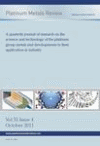-
oa Platinum Catalysts Used in the Silicones Industry
Their Synthesis and Activity in Hydrosilylation
- Source: Platinum Metals Review, Volume 41, Issue 2, Apr 1997, p. 66 - 75
-
- 01 Jan 1997
Abstract
Hydrosilylation is a reaction widely used in the silicones industry for the preparation of monomers, containing silicon-carbon bonds, and for crosslinking polymers, and results in a variety of products. Hydrosilylation reactions are catalysed by highly active platinum catalysts, such as the silicone-soluble Karstedt’s catalyst, which is prepared by the reaction of chloroplatinic acid, H2PtCl6, with vinyl-silicon containing compounds, such as divinyltetramethyl-disiloxane, Mvi Mvi – Inhibitors are widely used during hydrosilylation reactions to prevent premature crosslinking of polymers at ambient temperature, but permit rapid platinum-mediated crosslinking reactions at higher temperatures. Platinum colloids are formed at the end of the reaction and were identified by analysis. This paper discusses the mechanism of the hydrosilylation reaction, catalyst formation, characterisation, the effects of inhibitors and the range and complexity of the end products.


